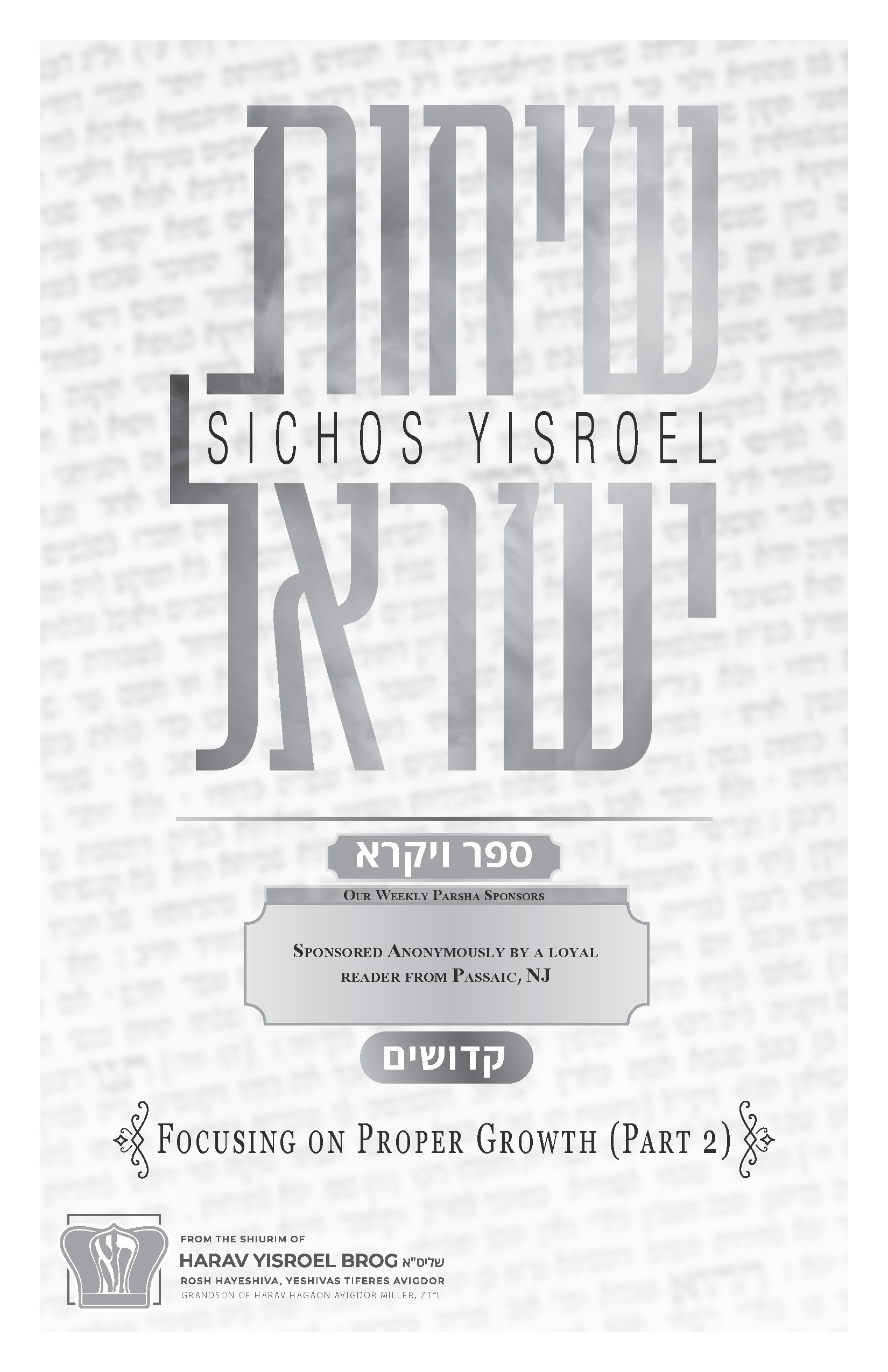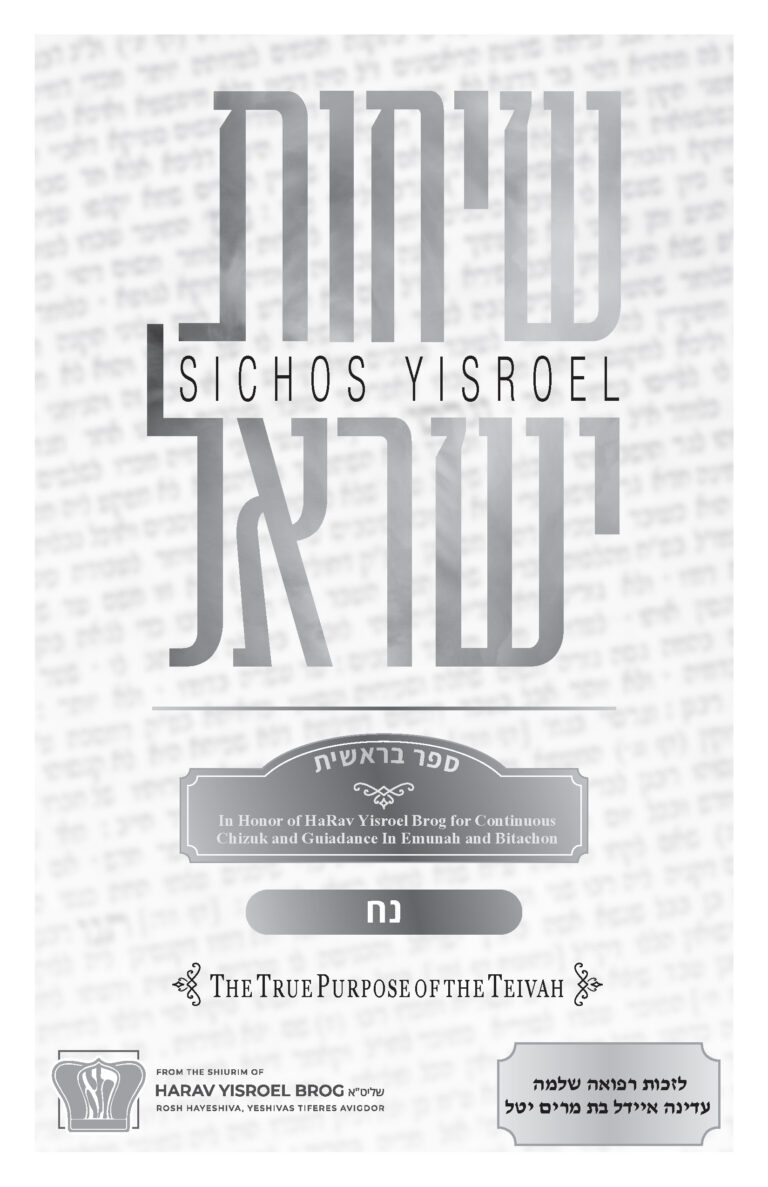Kedoshim 5784: Focusing on Proper Growth (Part 2)
Sponsored Anonymously
by a loyal reader from Passaic, NJ
Consider sponsoring a shiur
Visit YTATorah.org
Shiur presented in 5779
כל עדת בני ישראל is Commanded to be Holy
In this week’s parshah, it says וידבר ה’ אל משה לאמר דבר אל כל עדת בני ישראל, “and Hashem spoke to Moshe, saying: ‘Speak to all of Bnei Yisroel…” (Vayikra 19:2). You have to know that this is a very rare introduction. There’s דבר אל בני ישראל but דבר אל כל עדת בני ישראל is very unique. Hashem wanted every single part of Klal Yisrael to be involved in this parshah. Rashi points out that for this parashah Klal Yisrael was commanded to come together and to hear directly what Moshe Rabeinu had to say. Other parshiyos they didn’t hear directly from Moshe. Rashi says that the reason is שרוב גופי תורה תלוים בה, most of the great principles and fundamentals are mentioned in this parshah.
Now, after seeing that preface, the first mitzvah mentioned here appears to be a bit strange. The first mitzvah that’s mentioned here is קדושים תהיו, “you shall be holy.” Now, generally what does the word ‘holy’ mean? It means a kodoshdike person – someone who is dedicated to one purpose. Rashi himself elsewhere says clearly that it means מובדל ומופרש. A holy person is someone who is separate, who stands unique amongst mankind or amongst Klal Yisrael. When we say an individual is a heilegeh Yid, we mean to say that among Klal Yisrael, he stands above and beyond.
The Torah actually utilizes the term kadosh even when something is prohibited because it means it’s separated from you. It doesn’t always mean separated “up.” It can mean separated “down.”
But here, the Torah says that everybody, every man, every woman, every teenager has a mitzvah and a tzivuy to be kadosh. Why? The passuk goes on to say כי קדוש אני ה’ אלקיכם, “because I, Hashem am kadosh.” Hashem is definitely unique. Hashem is not superman. Hashem is in a class entirely of His own. He is echad. There is no one like Him in metzius. There is no one like Him in hanhagah. And Hashem says He wants us, Klal Yisrael, to be unique amongst mankind. That is amazing.
Now, obviously, if Hashem tells me to be unique, it’s not that you are unique. Hashem told us we are a unique nation. We’re His chosen nation. That’s not a mitzvah. That’s a fact. Hashem chose us as His nation. We are His am segulah. That’s a tremendous gift that Hashem has given us. But Hashem told us, “I want you to be kadosh.” That means naturally, we’re not kadosh. Naturally, we’re not different from anyone else. Hashem wants us to be kadosh.
What Defines Being Holy?
Now, what is the klal of kedushah? How does a person manifest or exhibit kedushah? That’s a machlokes. But I’m not getting into the specifics. How does kedushah by a human being look? What would you say? If it’s not something that’s natural, it’s something you have to create yourself. What would you say is the nekudah of kedushah? The answer to the question is – and remember this – to control your otherwise natural conditions. Self-control is what kedushah is. Self-control is the kedushah of mankind.
If everybody is smoking and you’re also smoking, you’re not a heilegeh Yidin that area. If you are able to elevate yourself and demonstrate self-control, then you are a heilegeh Yid in that area. We have to know in what area Hashem is referring to when He tells me to control myself. But you have to understand what Hashem is saying is that a human being has the ability to control himself. Hashem empowered us. It’s not natural. It’s not a gift. The gift is the capability. We have the ability. Now, I might say this encompasses the whole Torah. You have the ability to control yourself and fulfill taryag mitzvos. That’s not what it’s referring to. It refers to specific areas. Self-control is the manifestation of kedushah. It’s prishus.
An Impossible Comparison
Now the passuk tells us: Be kadosh, control yourself, be separate, separate yourself from your natural urges that general mankind exhibits and runs after. And then it says, you know why? כי קדוש אני. Chazal (Vayikra Rabba 24:9) say, יכול, I would think, כמוני, that Hashem expects you to be like Himself. תלמוד לומר לא כי קדוש אני קדושתי למעלה מקדושתכם, My kedushah is greater than your kedushah.
This is a famous Chazal that really begs to be understood. What was the hava mina? How could Chazal suggest that Hashem expected human beings to be as kadosh as He is? How is that possible? This was a question that the Mirrer Rosh Yeshivah, Rav Chaim Shmuelevitz (1902-1979), zecher tzaddik levrachah,would pose at many occasions. He would say, “Vus is de hava mina. What was the hava mina?” Could you expect a person to reach the darga of controland kedushah of Hakadosh Baruch Hu Himself?! This is like wild stuff.
In תשל”ב the Mirrer Yeshivah added a wing to their building and they made a big ceremony for this occasion. And on that occasion Rav Chaim Shmuelevitz spoke and said over this Chazal. Sitting there was the Zhviller Rebbe. He was Rav Mordechai Goldman of Zhvil (1910-1981). He was a heilegeh Yid. He was a neighbor of the yeshivah and he came to this chanukas habayis. At the chanukas habayis, Rav Chaim Shmuelevitz posed this question. Now, Rav Mordechai Zhviller was the einekel of the famous, holy, great tzaddik and ba’al mofes known as Rav Shlomke Zhviller (d. 1945). Rav Chaim said over this kasha. And then he turned to Rav Mordechai and said, “Clearly, a person who asks such a question doesn’t know how great a man is. He does not fathom the greatness of a Yid and to what degree and what madreigah a human being could reach and attain.” He said, “If the passuk would not tell me כי קדוש אני, that My kedushah is greater than yours, we would taka think that a person could reach the madreigah of kedushah of Hashem.”
He turned to Rav Mordechai Zhviller and he said, “Zhviller Rebbe, someone who recognized and knew your zeida, Rav Shlomke, would never ask such a question, what’s the hava mina, because your zeida was aza heilegeh Yid.He reachedsuch levels of kedushah. It was just out of sight. Off the charts! But for regular people who don’t know who Rav Shlomke Zhviller was,” he said, “we have the kasha. What’s the hava mina?”
So, what is the answer to this question? What’s the explanation? What’s taka the hava mina?
The Ramchal Defines Kedushah
The answer to this question is as follows. First, let’s learn a short paragraph from the Ramchal’s sefer Mesillas Yesharim (פרק כו). He says very fundamental principles over there. He writes: ענין הקדושה, what is the concept of kedushah? He says it is kafel, there are two parts to kedushah. Number one, he says, it’s techilaso – avodah. To attain kedushah, to climb the mountain of kedushah it’s techilaso avodah. It’s work. But vesofo – gemul, at the end, there is a lot of good reward. The second part, he says, is techilaso hishtadlus, you’ve got to be meshtadel and besofo matanah. Then he explains what that means.[i]
The Ramchalsays, initially a person has to be mekadesh himself somewhat. The end is Hashem is mekadesh him. And that’s what Chazal say (Yoma 39a): when a person is mekadesh himself me’at, a little, מקדשין אותו הרבה, they’re mekadesh him a lot. When a person works on himself milematah, down below, here on this world, מקדשין אותו מלמעלה, they’re mekadesh him from Above. The hishtadlus is that a person attempts to control himself, to separate himself from his natural drives, his natural urges, and tries to cling to Hashem. But, he says, you should know that the emes is – that’s impossible for a person to do that. You know why? Because a person is a physical being and a person can’t acquire this middah of kedushah, כי כבד הוא ממנו, the kedushah that Hashem demands of me is too much. Because sof sof I’m a mortal, a chumri, a gashmi, a baser vedam.
Therefore, says Ramchal, I’m going to tell you something. Sof hakedushah is matanah. It’s a matanah. It’s a gift. The only thing a person is capable of doing is to learn self-control, pursue the true knowledge and continued connection to Hashem and awareness of Hashem. But you reach your capabilities and you can’t do it anymore, and in the end, Hakadosh Baruch Hu Himself will guide you and will lead you, and carry you across the finish line, בדרך שהוא חפץ ללכות בו. Hashem will place His kedushah on you and then you’re going to be matzliach and you’re going to be able ultimately to attach yourself to Hakadosh Baruch Hu. Whatever the nature of a person prevents him from attaining, Hashem will give him as a present.
A Matanah from Shamayim
Now, you have to know that the sefer Mesillas Yesharim is not a sefer of exaggerations. Every word in that sefer is exact. After seeing the Ramchal’s words we can understand what the hava mina was to think that a person is charged with having the kedushah of Hashem. Because kedushah is only something which a human being can begin the journey on. A human being cannot conclude the journey. The hava mina of Chazal was: If kedushah is something that a human being has to just undertake to do minimally – something which he’s capable of doing, and at the end he receives it as a matanah from Hashem – so attaining kedushah is a matanah from Shamayim. Nu? If it’s a matanah from Shamayim, is there any limit for Hashem’s matanah?
So all the hava mina was that Hashem wants you to be a chafetz – to have desire, to reach the level of kedushah of the Ribono Shel Olam. That means, you should want it, you should do what you’re capable of doing, and Hashem will grant you the matnas Shamayim to get there the rest of the way.
And Chazal are telling us, no! There is a limit to the kedushah that a man can attain. You have to be a kadosh. You have to rise above your natural urges. But there’s a limit to the matanah of kedushah from Hashem.
So when we look at individuals, at people who seem to have acquired a sense of self-control of their urges, that’s unbelievable, because naturally our urges control us. Our urges dictate to us what we should eat, how much we should eat, where we should go, when we should go, how much to sleep, where we should look, what negative behavior we should engage in. And Hashem says every single Jew is capable of attaining the gift of kedushah. But what is that gift? What is the gift of kedushah? The gift of kedushah is only granted after you’ve engaged in peulos, in actions to control yourself. Meaning to say, that kedusha doesn’t mean reaching some level of holiness (as many may think), rather kedusha means engaging in the peulos of self-control, even to a small degree! Any single peulah that a human being engages in, is considered moradige in Shamayim. Any time a Yid is kofeh his yetzer hara the smallest kefiah is a huge achievement!
The Ta’anis HaRa’avid
The Ra’avid writes about a ta’anis that became known as the Ta’anis HaRa’avid. Many people see it and they say, “That’s a ta’anis? That’s not a ta’anis. A ta’anis is a ta’anis.”Ta’anis HaRa’avid is that when you’re eating a meal, leave over a little piece when you want to finish it. Not when you’re full, not when you’re stuffed, and it’s disgusting to you. When you like that piece. You want to get that last shtickel steak. And then you leave it there. Of course, the yetzer hara tells you it’s bal tashchis. It’s not bal tashchis, because it has a wonderful purpose.
For a person to control his yetzer hara, to be kofeh his yetzer hara, is such an amazing thing, it even supersedes rules of the Torah.
There’s a famous gemara in Bava Metzia (32b)that says, let’s say you meet up with a friend, a fellow Jew whom you hate and he has an animal that needs assistance being loaded.[ii] Then you have another friend, a tzaddik, a yakar, a chaviv, an erliche Yid who has an animal that’s nebach overburdened by his sukkah. He’s got the sukkah on the back of that animal. It looks like it’s about to collapse. There’s a very big mitzvah to help your fellow man unload his animal. It’s two mitzvos. Number one, you’re sparing tza’ar ba’alei chaim and you’re doing a chessed with your friend. So who would you say you have to help? The Torah says, you know who you should help? What’s a bigger mitzvah, loading or unloading? Unloading. So you’d think here’s a tzaddik who needs help unloading, so go ahead and help him. But the gemara says the opposite! It’s true that if you have two friends, talmidei chachamim, you’ve got to help unload first. But if you see a rasha, a guy whom you saw do aveiros that rendered him legally to be a rasha and you’re allowed to hate him, you have to go help him out first .
So the gemara says, how could it be? What’s the pshat? You know what the gemara says? Because to do this you’re accomplishing kefias hayetzer. You’re breaking your yetzer hara. You’re engaging in self-control. You’re controlling your urges. Your natural urge is not to help this guy and you tell yourself helping the other person is a bigger mitzvah and it’s a double mitzvah. The Torah says no. The fact that you’re breaking your yetzer hara, that makes it the mitzvah that you have to do.
Anytime a person wants to do a physical thing, a simple thing, like eating pretzels – is it an aveirah? No. You say, “I’m going to have one less than I would like to have.” You take a handful and you say, “Ah, that looks good!” You’re thinking of the crunch, thinking of the salt. You start to salivate. You say, “Okay I’m going to be frum. I’m going to make a brachah rishonah. I’ll make a brachah achronah.”You start to kler do you have a shiur or not a shiur. You say, “You know what? Let me put back just one. Not for diet’s sake and not for health’s sake. Just to be kofeh my yetzer hara.” You know what you just did? A tremendous accomplishment like you can’t imagine!
Developing your Self-Control
My zeida (Rav Avigdor Miller) was a man of tremendous self-control. From the time I knew him, as a young child, I never saw him eating mezonos. In his shul, there was a kiddush. He never partook of it. He didn’t eat mezonos. I used to think that he didn’t like mezonos. I once asked my mother, “Did your father not like cakes and cookies?” She said, “I remember when he was younger he used to come home for lunch and eat a large piece of cake and a cup of milk. That’s what he liked having for lunch. At some point in time, he said ‘no more mezonos.’” It’s amazing. No more mezonos. The control that he had on himself was just not normal, in many, many areas. That’s what made him a kadosh. I always wondered how he did it. He wasn’t doing it with a chaburah. He was doing it by himself. But Hashem says: קדושים תהיו, and it comes from any self-control that you engage in.
Now, there are many people who have natures that almost defy self-control. There are certain people who are hyper and their hyper nature demands that when they want something, they have to have it. They can’t control themselves. In people with tremendously addictive personalities, it’s very common. They want something and they have to have it now. Now, there are some people who didn’t have these strong urges but they developed them. They’ll go five minutes to get a cigarette in the middle of the night because they have to have that cigarette. That’s a very, very sick human being, obviously. Some people go for some candy, for pizza. You have to be aware of the fact that you have no self-control.
I’ve had people who became aware of how weak they were and it frightened them. They came to the realization that if they wanted to do something, there was nothing they would not do. That is frightening because we’re all built with a lot of natural urges and they’re not all kosher lemehadrin. Now when a person wants something, you know what he says? “I can’t help myself. I just can’t help myself.” But it’s not true. It means to say you didn’t engage yet in any activity of self-control. Self-control in and of itself is a tremendous accomplishment. Because any time you control your yetzer hara you’re being kofeh the yetzer hara and when you’re kofeh your yetzer hara you’re taking all the ra in the world, the whole source of the yetzer hara and you’re weakening it.
When you do a mitzvah, you’re not weakening the koach hara in the world. You’re strengthening the koach hatov but the koach hara still remains. That’s why Yosef is called the tzaddik yesod olam.Yosef’s self-control was of such a magnitude that he pashut imbued in the world a tremendous koach for us to control ourselves. Now there are people who choose not to enjoy getting such a gift. They want what they want. They go down that path, rachmana litzlan.
A Practical Exercise in Self-Control
Hakadosh Baruch Hu should help us. Hakadosh Baruch Hu should grant us the ability. I want to make a suggestion. Since this is a time of the year in which we’re working on our ruchniyus and the mitzvah of קדושים תהיו applies to everybody, everyone should be mekabel one small thing that they’re going to exhibit self-control on. Take a very small thing, like the pretzel example. Put back two pretzels. Take on something small. If you’re going to have a few bowls of cereal say, “I’ll take a little less.” When you want to do something, everybody knows certain things, behaviors, that he wants to engage in, that is when you should say, “Hakadosh Baruch Hu, I’m going to work on kedushah.”
Now, when you work on self-control in one little area you will have the koach of self-control in all areas eventually. One of the things that I ask this zman is that people should stop smoking cigarettes. To stop smoking entirely?! Chas veshalom. That would be like asking for the madreiga of yachol kamoni; that wouldbe already like Hakadosh Baruch Hu to reach such a madreigah. We never had such a madreigah. But at least the traditional cigarettes, people should stop smoking. Instead, take an e-cigarette, whatever you need, but apply self-control. Any bachur that came to the yeshivah and was able to control himself for thirty days demonstrated to me that he can change. Any bachur who could not keep himself for thirty days without smoking is a mufkar. He’s a beheimah. He has no control over himself a ki huzeh klal. He has no shaychus to the gadlus ha’adam. You know what he’s saying? “It’s only a smoke.” In other areas the yetzer hara has you coming and going, twisted around his little finger – today, אמר לו כך, tomorrow, is אמר לו כך. The fact alone that you feel you have to smoke is a reason you should run from it like you run from a snake because that means you’re controlled by it and you are losing the ability to take control of yourself.
I don’t mind whatever a guy does. He wants to enjoy himself once in a while, okay, but if you lose control then you’re toast, because there’s nothing that you want that you won’t get. That means any aveirah, כל חטא וחטא. If I look at a bachur and I see he can’t control himself for thirty days, I can tell you what areas and how many aveiros the guy is doing. He is shakuah.
Ai, he’ll tell you, “In the last few days, I didn’t do the cheit.” In such a case, I say, “The yetzer hara is just preparing you for the next round. The yetzer hara is working on you. He’s driving you. He’s riding you. You’re his surfboard, my friend. And every time, he creates a wave and you are his wave and he loves you because he rides on you like a chamor. Like Bilam rode his chamor, that’s how the yetzer hara is riding you. And you’re a real gornisht.”
קדושים תהיו, exhibit some self-control, rabbosai. That’s what it is. There were many bachurim who came and didn’t smoke. I said, “Do you like music? For thirty days go without music.” If they couldn’t, that means they had no control. No control. If you have no control, it means you have no shaychus to anything about being an adam. That’s the difference between an adam and beheimah. The beheimah has no ability to control itself and a human being does. So you have to exercise your koach of control. Then you have a shaychus to the chelek Elokah mimal, to the kedushas Hakadosh Baruch Hu that Hashem imbued us with and Hashem put in us.
The Ramchal said you have abilities that you don’t know about. Even though your urges seem to counter that kedushah. Everybody tells me this one line: “Rabbi Brog, I have to tell you. I’m different. I was born with the yetzer hara on top of me.” I said, “That’s an ofene passuk. It says כי יצר לב האדם רע מנעוריו. Why are you different from everybody else? You’re a normal human being. The difference is you never controlled yourself. The yetzer hara owns you 100%. Turn it around. Start to get some self-control.” Hakadosh Baruch Hu should help us.
The Bottom Line
Torah’s command of קדושים תהיו instructs every person in Klal Yisroel to separate themselves from even something that, in principle, is not prohibited. We are commanded to be unique, to be kadosh, because our natural tendencies are not intrinsically different from any other nation. Hashem wants us to be kadosh, which means controlling our otherwise natural tendencies and urges that the rest of the world pursues. Self-control is the source of attaining kedusha, which in itself is also a tremendous gift from Hashem! Ultimately, however, no matter how much we try to practice self-control, we are all still physical beings, and as such, we can’t come close to the level of, “yachol kamoni” being as kadosh as Hashem. Nevertheless, whatever level of kedusha we cannot possibly achieve by ourselves will be granted to us a matanah from Above – after we “do our part.” Kedusha, therefore, is only granted after we engage in actions to control our urges and natural desires. Some examples of kfias hayetzer – the power that Yosef Hatzaddik brought down into the world that we can tap into – include leaving some food on our plate, helping someone with whom we have a complicated relationship, or even giving up certain foods or practices. Ultimately, these are all opportunities to practice self-control and come closer to fulfilling the mitzvah of קדושים תהיו. This coming week, I will, bli neder, attempt to follow some of these practices and say to myself while I am separating myself from them, “Hashem, I am abstaining from this practice to fulfill your command in the Torah of being holy. Please assist me in my endeavor, I cannot do it without Your help!”
[i] עִנְיַן הַקְּדֻשָּׁה כָּפוּל הוּא, דְּהַיְנוּ: תְּחִלָּתוֹ עֲבוֹדָה וְסוֹפוֹ גְּמוּל, תְּחִלָּתוֹ הִשְׁתַּדְּלוּת וְסוֹפוֹ מַתָּנָה. וְהַיְנוּ: שֶׁתְּחִלָּתוֹ הוּא מָה שֶׁהָאָדָם מְקַדֵּשׁ עַצְמוֹ, וְסוֹפוֹ מָה שֶׁמְּקַדְּשִׁים אוֹתוֹ, וְהוּא מָה שֶׁאָמְרוּ זַ”ל (יומא לט א): אָדָם מְקַדֵּשׁ עַצְמוֹ מְעַט מְקַדְּשִׁים אוֹתוֹ הַרְבֵּה. מִלְּמַטָּה מְקַדְּשִׁים אוֹתוֹ מִלְּמַעְלָ, וכו’. וְאָמְנָם לְפִי שֶׁאִי אֶפְשָׁר לָאָדָם שֶׁיָּשִׂים הוּא אֶת עַצְמוֹ בַּמַּצָּב הַזֶּה כִּי כָבֵד הוּא מִמֶּנּוּ, כִּי סוֹף סוֹף חָמְרוֹ הוּא בָּשָׂר וָדָם, עַל כֵּן אָמַרְתִּי שֶׁסּוֹף הַקְּדֻשָּׁה מַתָּנָה, כִּי מָה שֶׁיּוּכַל הָאָדָם לַעֲשׂוֹת הוּא הַהִשְׁתַּדְּלוּת בִּרְדִיפַת הַיְּדִיעָה הָאֲמִתִּית וְהַתְמָדַת הַהַשְׂכָּלָה בִּקְדֻשַּׁת הַמַּעֲשֶׂה, אַךְ הַסּוֹף הוּא שֶׁהקב”ה יַדְרִיכֵהוּ בַּדֶּרֶךְ הַזֶּה שֶׁהוּא חָפֵץ לָלֶכֶת בָּהּ, וְיַשְׁרֶה עָלָיו קְדֻשָּׁתוֹ וִיקַדְּשֵׁהוּ, וְאָז יִצְלַח בְּיָדוֹ זֶה הַדָּבָר, שֶׁיּוּכַל לִהְיוֹת בַּדְּבֵקוּת הַזֶּה עִמּוֹ יִתְבָּרַךְ בִּתְמִידוּת. כִּי מָה שֶׁהַטֶּבַע מוֹנֵעַ מִמֶּנּוּ יַעַזְרֵהוּ יִתְבָּרַךְ וְסִיּוּעוֹ יִתֵּן לוֹ, וּכְעִנְיָן שֶׁנֶּאֱמַר (תהלים פד:יב): לֹא יִמְנַע טוֹב לַהֹלְכִים בְּתָמִים. וְעַל כֵּן אָמְרוּ בַּמַּאֲמָר שֶׁזָּכַרְתִּי אָדָם מְקַדֵּשׁ עַצְמוֹ מְעַט שֶׁהוּא מָה שֶׁיּוּכַל הָאָדָם לִקְנוֹת בְּהִשְׁתַּדְּלוּתוֹ, מְקַדְּשִׁים אוֹתוֹ הַרְבֵּה שֶׁהוּא הָעֵזֶר שֶׁעוֹזֵר אוֹתוֹ ה’ יִתְבָּרַךְ וּכְמוֹ שֶׁכָּתַבְנוּ. וְהִנֵּה הָאִישׁ הַמִּתְקַדֵּשׁ בִּקְדֻשַּׁת בּוֹרְאוֹ אֲפִלּוּ מַעֲשָׂיו הַגַּשְׁמִיִּים חוֹזְרִים לִהְיוֹת עִנְיָנֵי קְדֻשָּׁה מַמָּשׁ, וְסִימָנָךְ אֲכִילַת קָדָשִׁים שֶׁהִיא עַצְמָהּ מִצְוַת עֲשֵׂה, וְאָמְרוּ זַ”ל (פסחים נט ב): כֹּהֲנִים אוֹכְלִים וּבְעָלִים מִתְכַּפְּרִים. וְתִרְאֶה עַתָּה הַהֶפְרֵשׁ שֶׁבֵּין הַטָּהוֹר לַקָּדוֹשׁ: הַטָּהוֹר, מַעֲשָׂיו הַחָמְרִיִּים אֵינָם לוֹ אֶלָּא הֶכְרֵחִים, וְהוּא עַצְמוֹ אֵינוֹ מִתְכַּוֵּן בָּהֶם אֶלָּא עַל צַד הַהֶכְרֵחַ, וְנִמְצָא שֶׁעַל יְדֵי זֶה יוֹצְאִים מִסּוּג הָרַע שֶׁבַּחָמְרִיּוּת וְנִשְׁאָרִים טְהוֹרִים, אַךְ לִכְלַל קְדֻשָּׁה לֹא בָּאוּ, כִּי אִלּוּ הָיָה אֶפְשָׁר בִּלְתָּם, כְּבָר הָיָה יוֹתֵר טוֹב. אַךְ הַקָּדוֹשׁ הַדָּבֵק תָּמִיד לֵאלֹהָיו, וְנַפְשׁוֹ מִתְהַלֶּכֶת בֵּין הַמֻּשְׂכָּלוֹת הָאֲמִתִּיּוֹת בְּאַהֲבַת בּוֹרְאוֹ וְיִרְאָתוֹ, הִנֵּה נֶחְשָׁב לוֹ כְּאִלּוּ הוּא מִתְהַלֵּךְ לִפְנֵי ה’ בְּאַרְצוֹת הַחַיִּים עוֹדֶנּוּ פֹּה בָּעוֹלָם הַזֶּה. וְהִנֵּה אִישׁ כָּזֶה הוּא עַצְמוֹ נֶחְשָׁב כַּמִּשְׁכָּן, כַּמִּקְדָּשׁ, וְכַמִּזְבֵּחַ, וּכְמַאֲמָרָם זִכְרוֹנָם לִבְרָכָה (בראשית רבה מז:ח): וַיַּעַל מֵעָלָיו אֱלֹהִים (בראשית לה:יג), הָאָבוֹת הֵן הֵן הַמֶּרְכָּבָה, וְכֵן אָמְרוּ (רש”י בראשית לה:יג): הַצַּדִּיקִים הֵן הֵן הַמֶּרְכָּבָה. כִּי הַשְּׁכִינָה שׁוֹרָה עֲלֵיהֶם כְּמוֹ שֶׁהָיְתָה שׁוֹרָה בַּמִּקְדָּשׁ. וּמֵעַתָּה הַמַּאֲכָל שֶׁהֵם אוֹכְלִים הוּא כְּקָרְבָּן שֶׁעוֹלֶה עַל גַּבֵּי הָאִשִּׁים, כִּי וַדַּאי הוּא שֶׁיִּהְיֶה נֶחְשָׁב לְעִלּוּי גָּדוֹל אֶל אוֹתָם הַדְּבָרִים שֶׁהָיוּ עוֹלִים עַל גַּבֵּי הַמִּזְבֵּחַ כֵּיוָן שֶׁהָיוּ נִקְרָבִים לִפְנֵי הַשְּׁכִינָה, וכו’.
[ii] תָּא שְׁמַע: אוֹהֵב לִפְרוֹק וְשׂוֹנֵא לִטְעוֹן – מִצְוָה בְּשׂוֹנֵא, כְּדֵי לָכוֹף אֶת יִצְרוֹ. וְאִי סָלְקָא דַּעְתָּךְ צַעַר בַּעֲלֵי חַיִּים דְּאוֹרָיְיתָא, הָא עֲדִיף לֵיהּ? אֲפִילּוּ הָכִי, כְּדֵי לָכוֹף אֶת יִצְרוֹ עָדִיף.






